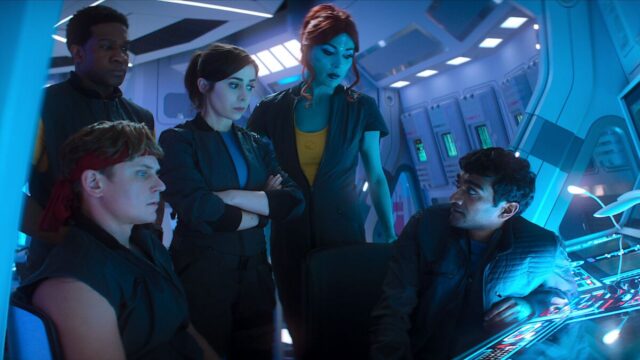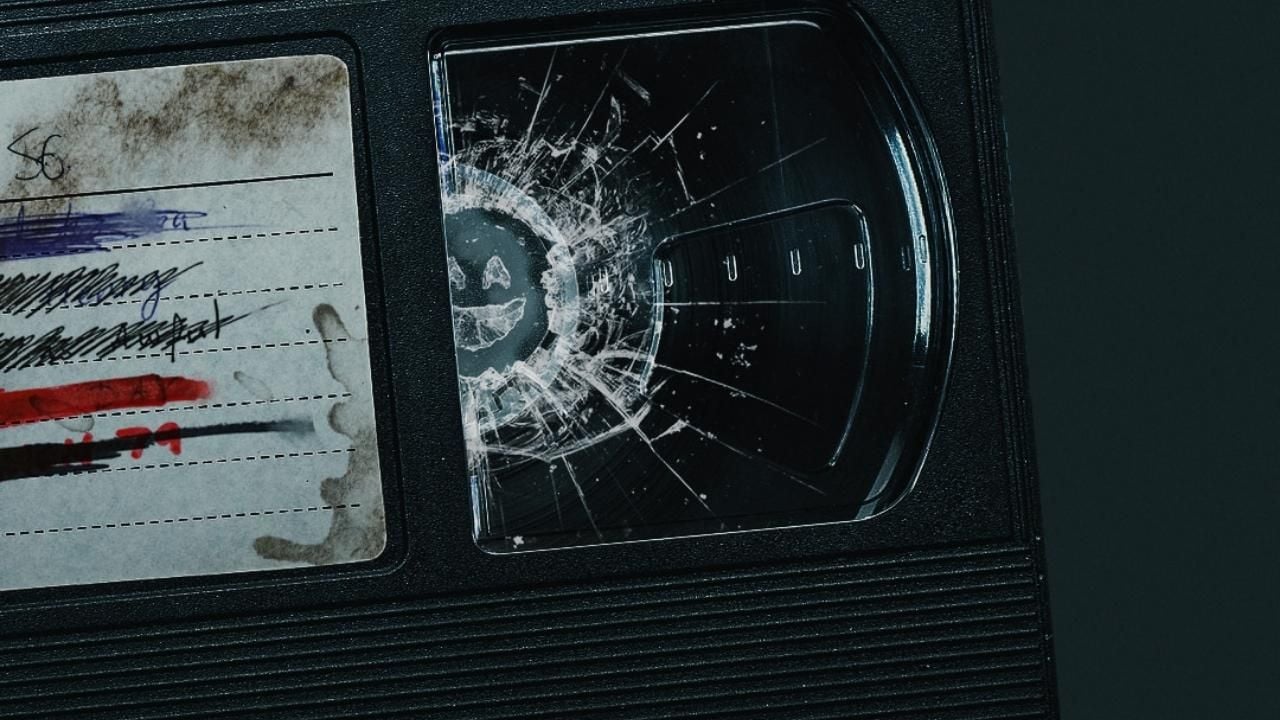Black Mirror fans were thrilled when the Season 7 finale revisited one of the series’ most iconic episodes, USS Callister. The sequel, USS Callister: Into Infinity, picks up where the original left off, exploring the fate of Nanette Cole and her crew as they navigate the vast and dangerous online multiverse of the Infinity game.
This article breaks down the ending, its implications, and what it means for Nanette and her team.
What Happened in the Original USS Callister?

Let’s recap the original episode before diving into Into Infinity. In Black Mirror Season 4, Robert Daly, a reclusive programmer and co-founder of the Infinity game, created a modded version of the game to trap digital clones of his coworkers.
These sentient clones were subjected to Daly’s cruel whims until Nanette Cole led a daring rebellion. The crew escaped through a wormhole into the main Infinity multiverse, leaving Daly trapped in his modded universe, which was subsequently deleted by the game’s firewall.
The original episode ended on a seemingly optimistic note, with Nanette taking over as captain of the USS Callister. However, as Into Infinity reveals, their journey is far from over.
The Setup for Into Infinity: A Dangerous New World
The sequel begins with confirmation that Robert Daly is dead, having been left in a vegetative state in his apartment after being unable to log out of his modded game.
Meanwhile, Nanette and her crew have fully integrated into the online multiplayer world of Infinity. What initially seemed like freedom quickly becomes a fight for survival as they encounter hostile players and unpredictable challenges in this vast digital universe.
What Happens to Nanette and Her Crew?

Nanette Takes Command
Nanette Cole (Cristin Milioti) emerges as a strong and resourceful leader in Into Infinity. As captain, she must navigate the dangers of the online multiverse and the emotional toll of their newfound existence. The crew faces moral dilemmas about their purpose and identity as digital beings. Are they still human, or are they merely code?
The Threat of Gamer691
One of their first major challenges comes in the form of Gamer691 (voiced by Aaron Paul), a toxic player who embodies everything wrong with online gaming culture. Gamer691’s aggressive tactics force Nanette and her crew to confront the darker side of their new reality.
The episode cleverly critiques cyberbullying and toxic behavior in online spaces while showcasing Nanette’s strategic brilliance as she outsmarts Gamer691 in a tense showdown.
Exploring Identity and Purpose
Each crew member grapples with their sense of self as they traverse different realms within Infinity. Walton (Jimmi Simpson), who sacrificed himself in the original episode, makes a surprising return as a fragmented piece of code within Infinity. His reappearance raises questions about memory, loss, and whether true freedom is ever possible for digital beings.
The Ending Explained: Did Nanette Find True Freedom?

The finale of Into Infinity is both thrilling and thought-provoking. After surviving numerous encounters with hostile players and rogue AI factions, Nanette leads her crew to a hidden sector within Infinity. This sector allows them to rewrite their code entirely—a chance to erase their memories and start anew as independent entities free from past traumas.
Nanette’s Choice
Nanette faces an agonizing decision: should she allow her crew to forget who they were in order to live without fear or pain? Ultimately, she decides against it, believing that their shared experiences define them as individuals. Instead, she vows to create a safe haven within Infinity, where they can continue exploring without compromising their identities.
A Hopeful Yet Uncertain Future
The final scene shows the USS Callister embarking on a new journey through uncharted territories within Infinity. While their future remains uncertain, there’s hope as Nanette declares they will face whatever comes together as a family.
This ending encapsulates Black Mirror’s signature blend of optimism and unease, leaving viewers pondering what freedom truly means.
Key Themes in USS Callister: Into Infinity

1. Toxic Online Culture
The depiction of Gamer691 highlights the pervasive issue of cyberbullying in online gaming communities. The episode critiques how anonymity can bring out the worst in people while emphasizing the importance of standing up against such behavior.
2. Identity and Humanity
The crew’s struggle to define themselves as digital beings raises profound questions about what it means to be human. Can consciousness exist without a physical body? Are memories enough to sustain identity? These philosophical dilemmas are at the heart of Into Infinity.
3. Leadership and Sacrifice
Nanette’s journey from reluctant leader to confident captain underscores themes of responsibility and sacrifice. Her decisions reflect her commitment to protecting her crew while staying true to her values—a stark contrast to Daly’s authoritarian rule in the original episode.
How Does Into Infinity Compare to the Original?

While the original USS Callister was praised for its clever twist on workplace dynamics and power abuse, Into Infinity expands its scope by exploring broader societal issues like online toxicity and existential identity crises. The sequel is more action-packed but retains the emotional depth that made its predecessor so impactful.
However, some fans might find the sequel less tightly focused than the original, as it juggles multiple storylines and themes. That said, it successfully builds on the foundation of Season 4 while offering fresh insights into life within virtual worlds.
Is There Room for Another Sequel?
The ending of Into Infinity leaves plenty of room for further exploration. With Nanette and her crew venturing into uncharted territories within Infinity, future episodes could delve deeper into their interactions with other players or even explore ethical dilemmas surrounding AI rights in virtual spaces.
Creator Charlie Brooker has hinted that he’s open to revisiting these characters if there’s a compelling story to tell—so fans should keep their fingers crossed!
Final Thoughts: A Must-Watch Episode for Black Mirror Fans

USS Callister: Into Infinity is a worthy sequel with action and emotional resonance. It expands on the themes introduced in the original while tackling new issues relevant to today’s digital age. Cristin Milioti shines as Nanette Cole, bringing depth and nuance to her role as captain of the USS Callister.
Whether you’re a long-time fan or new to Black Mirror, this episode will captivate you—and maybe even question your relationship with technology.
About Black Mirror
Black Mirror is a British anthology television series created by Charlie Brooker. Individual episodes explore a diversity of genres, but most are set in near-future dystopias with sci-fi technology—a type of speculative fiction. The series is based on The Twilight Zone and uses technology to comment on contemporary social issues.
The first two seasons of the series aired on the British network Channel 4 in 2011 and 2013. The programme then moved to Netflix in 2016 and its sixth season is scheduled to be released in June 2023.
The series has received critical acclaim and is considered by many reviewers to be one of the best television series of the 2010s. The programme won the Primetime Emmy Award for Outstanding Television Movie three times consecutively for “San Junipero”, “USS Callister” and Bandersnatch. However, some critics consider the morality of the series obvious or cite declining quality over time. Black Mirror, along with American Horror Story, has been credited with repopularising the anthology television format, and a number of episodes have been seen by reviewers as prescient.








No Comments on Black Mirror’s USS Callister: Into Infinity Ending Explained – What Really Happens to Nanette and Her Team?